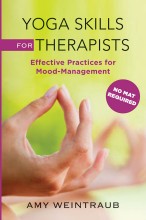Yoga teacher Amy Weintraub, the author of Yoga for Depression, has been bringing together yoga and mental health care for more than two decades, training therapists and yoga teachers to use breathing exercises, simple mantras, meditation, and yoga nidra (yogic sleep) in clinical settings. Her new book, Yoga Skills for Therapists: Effective Practices for Mood Management, offers mental health professionals yoga-based techniques for helping clients manage their moods. Weintraub, who recovered from her own depression with the help of yoga and meditation, culled through the vast treasury of yoga’s teachings to find accessible tools that help to balance the emotions. Yoga Journal spoke with her about yoga’s power to make you feel better.
Yoga Journal: Why has the use of yoga as a tool for mental health care become more prevalent?
 Amy Weintraub: There’s a growing number of research studies providing evidence that yoga belongs in a mental health treatment plan. It lowers cortisol, the stress hormone; it activates the parasympathetic system, which is calming; and it deactivates the limbic brain, which is overactive in people who are very anxious or have a history of trauma. And more therapists are experiencing the effects of yoga themselves and realizing this is a wonderful tool to offer clients.
Amy Weintraub: There’s a growing number of research studies providing evidence that yoga belongs in a mental health treatment plan. It lowers cortisol, the stress hormone; it activates the parasympathetic system, which is calming; and it deactivates the limbic brain, which is overactive in people who are very anxious or have a history of trauma. And more therapists are experiencing the effects of yoga themselves and realizing this is a wonderful tool to offer clients.
YJ: What’s the connection between mood and the body and breath?
AW: As yogis have understood for thousands of years, when we have events in our lives that are difficult, the body constricts. Any emotional constriction has a physical corollary. We can address the emotions by working with the body and the breath. For example, when we’re anxious, the breath is shallow in the upper chest. When we deepen the breath, we’re activating the parasympathetic nervous system and releasing some of the anxiety. We’re actually balancing the mood by extending the exhalation.
YJ: Can yoga’s philosophical teachings also help with anxiety and depression?
AW: The message of yoga is that deep within you, you are whole and healed, no matter what is going on in your life. Yoga can help you reconnect with a felt sense of that wholeness, of who you really are, beneath the current mood.
YJ: What underlies your approach to bringing yoga into therapy?
AW: My teaching is based on the pillars of self-awareness and self-acceptance: svadhyaya and karuna. Self-awareness in a yoga practice is paying attention to sensations in the body, being attentive and attuned. But when you’re paying attention to sensation, emotion will arise. If all you did was look at yourself without compassion, you’d burn up. It would be like Shiva dancing in the fire of self-awareness. That’s why you have to stay present with karuna. And that’s what both good psychotherapy and yoga practices offer.
YJ: Your book is a good argument for mental health professionals to learn about yoga. Is it also valuable for yoga teachers to know about mental health?
AW: It’s important for yoga teachers to know how to set a safe container and give options and modifications. There are certain breathing practices that can trigger anxiety, for example, and some that are contraindicated for bipolar disorder or eating disorders. There are a lot of subtleties that yoga teachers could benefit from learning.
Interview by Carmel Wroth, May 2013 Issue
Yoga Journal Interviews Amy Weintraub